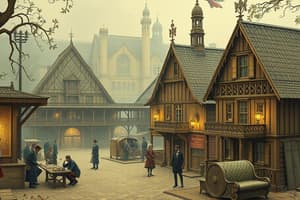Podcast
Questions and Answers
Which countries were the four main colonizers of America?
Which countries were the four main colonizers of America?
- France (correct)
- The Netherlands (correct)
- Spain (correct)
- England (correct)
What is mercantilism?
What is mercantilism?
An economic system to increase a nation's wealth by government regulation of all of the nation's commercial interests; the colony existed only for the mother country.
What were Encomiendes?
What were Encomiendes?
A labor system employed by the Spanish crown during the Spanish colonization of America and the Philippines.
Who was Father La Casas?
Who was Father La Casas?
What were the goals of early Spanish colonizers in the Americas?
What were the goals of early Spanish colonizers in the Americas?
What are creoles in the context of colonial Spanish America?
What are creoles in the context of colonial Spanish America?
How did France approach colonization in America?
How did France approach colonization in America?
What was the primary motivation for The Netherlands in colonizing America?
What was the primary motivation for The Netherlands in colonizing America?
What was the Joint Stock Company?
What was the Joint Stock Company?
What joint stock company founded Jamestown in 1607?
What joint stock company founded Jamestown in 1607?
Who were the Pilgrims?
Who were the Pilgrims?
What is predestination?
What is predestination?
What did Roger Williams advocate for?
What did Roger Williams advocate for?
What colony did Anne Hutchinson's followers found?
What colony did Anne Hutchinson's followers found?
What were the Chesapeake Colonies?
What were the Chesapeake Colonies?
Which colonies are known as the Middle Colonies?
Which colonies are known as the Middle Colonies?
What are Restoration Colonies?
What are Restoration Colonies?
What was the role of the Board of Trade and Plantations?
What was the role of the Board of Trade and Plantations?
What defines a Royal Colony?
What defines a Royal Colony?
What is a Proprietary Colony?
What is a Proprietary Colony?
What is a Self-Governing Colony?
What is a Self-Governing Colony?
What is Virtual Representation?
What is Virtual Representation?
What is Salutary Neglect?
What is Salutary Neglect?
What was the French and Indian War about?
What was the French and Indian War about?
What did the Treaty of Paris accomplish?
What did the Treaty of Paris accomplish?
Flashcards are hidden until you start studying
Study Notes
Colonization of America
- Spain, France, England, and The Netherlands were the four primary colonizers of America.
- Spain aimed to convert natives to Catholicism while seeking military power and wealth.
- France established cooperative relationships with Native Americans based on fur trade, particularly in the north and Canada.
- The Netherlands focused solely on economic pursuits, notably controlling the Hudson Trading Post in New Amsterdam.
- England's colonization was marked by conflict with Native Americans and the use of the Joint Stock Company model for funding colonies.
Economic Systems and Colonization Models
- Mercantilism is an economic theory advocating for government regulation of a nation's commerce to increase wealth, where colonies serve the mother country.
- The Joint Stock Company allowed multiple investors to share capital and profits; pivotal in founding colonies like Jamestown and Plymouth.
Key Early Settlements and Figures
- The London Company financed the establishment of Jamestown in 1607.
- The Pilgrims, led by William Bradford, sought religious freedom and signed the Mayflower Compact.
- The Puritans aimed to purify the Anglican Church of Catholic influences.
Notable Colonial Leaders
- Roger Williams established Rhode Island advocating for separation of church and state, opposed to the Puritan influence.
- Anne Hutchinson challenged the Puritan religious hierarchy, positing personal connections to God; her exiled followers founded New Hampshire.
Colonial Classifications
- Chesapeake Colonies include Connecticut, New Hampshire, Maine, and Maryland.
- Middle Colonies consist of New York, New Jersey, and Delaware.
- Restoration Colonies encompass the Carolinas and Georgia.
Governance and Colonial Types
- The Board of Trade and Plantations governed the colonies, advising the monarchy and overseeing colonial affairs.
- Royal Colonies were under direct control of the King, while Proprietary Colonies were founded by private parties with appointed governors.
- Self-Governing Colonies operated with a charter granting them relative autonomy.
Political Concepts
- Virtual Representation referred to the belief that Parliament represented all British subjects, including unrepresented colonists.
- Salutary Neglect was the British policy of lax enforcement of colonial laws, fostering autonomy among colonies.
Conflict and Consequences
- The French and Indian War (1754-1763) was fought over control of the Ohio River Valley, leading to English dominance and declining colonial attitudes toward England.
- The Treaty of Paris concluded the Seven Years War, with significant territorial changes favoring the British and impacting future colonial governance.
Studying That Suits You
Use AI to generate personalized quizzes and flashcards to suit your learning preferences.




